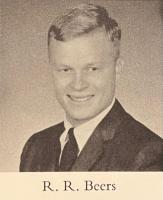-
Oral History Interview with William Donahue, who served in the Vietnam War. He first recounts his upbringing in Washington, D.C., and his higher education at Colby College. Donahue shares his path to enlisting in the Marine Corps after being denied a student deferment for law school. He describes the various training camps he attended before arriving in Vietnam, where he began as an infantry officer in 1967. Just as the Tet Offensive began in 1968, he was transferred to the Military Police Corps but soon returned to his infantry position. He describes his experiences on and off the battlefield and the relations between the men in his battalion, especially concerning race. Post-Vietnam, he continued his service as an instructor at Camp Lejeune, a training camp in North Carolina, and ended his active duty as a soldier in Guantanamo Bay, Cuba. Donahue closes out the oral history by detailing life after the war and how his perspective on the war has changed over time. Currently, he is writing a memoir about his war experiences.
-
Ernest Paul "Rusty" Sachs was born 7 May 1944 in St. Louis, Missouri. Rusty's father was in the Army and served in Normandy as a battalion surgeon. After Rusty's father left the Army in 1946, his family spent time in Normandy and France before returning to the United States. The majority of his childhood was spent growing up in Norwich, Vermont, where he graduated from Hanover High School. In 1961, Rusty moved to Gernoble, France after being waitlisted at Harvard. He attended L'Externat Notre-Dame, Université de Grenoble until he was accepted at Harvard the following year. After two years, Rusty left Harvard and joined the United States Marine Corps. He made his way into the Marine Aviation Cadet Program (MARCAD), a unique program where enlisted Marines with two years of college experience could become pilots and earn a commission as an officer in the United States Marine Corps. Rusty was sent to Vietnam in July of 1966 as a replacement pilot and was assigned to H-34 helicopter squadron HHM-362, which at the time was based out of Ky Ha. During Rusty's time in Vietnam, he flew 725 combat missions with his primary role being the medical evacuation of wounded soldiers and Marines. After returning from Vietnam, Rusty went back to Harvard to finish his bachelor's degree. He became involved with the group known as Vietnam Veterans Against the War (VVAW) as a speaker and organizer. In 1974, Rusty returned to Norwich, Vermont, and attended Vermont Law School in 1975. After one term in the Vermont House of Representatives, Rusty practiced law until 1999. Once he stopped practicing law, he returned to training flight instructors. He served as the Executive Director of the National Association of Flight Instructors until 2007. Rusty and Marlene Sachs are now retired and live in Norwich, Vermont.
-
F. Beirne Lovely. Class of 1968. Oral history interview for the Dartmouth Vietnam Project. Lovely discusses his time as a student at Dartmouth, his experience during the Vietnam War, and briefly about his career as a lawyer. While at Dartmouth Lovely participated in the Army Reserve Officers’ Training Corps (ROTC), joined crew his freshman year, and joined rugby and Chi Heorot his sophomore year. Lovely switched from the Army to the Marine Corps upon graduating from Dartmouth. Lovely attended a six-month training at The Basic School in Quantico, Virginia before being deployed to Vietnam. He was a second lieutenant and requested to go into the infantry and was assigned to Military Occupational Specialty (MOS) 0302. He was first stationed at Khe Sanh and was tasked with expanding the perimeter and describes a particularly deadly attack on his unit. Lovely frequently describes the men in the Marine Corps as having done a remarkable job.
-
William “Bill” Jevne. Class of 1966 and Tuck 1967. Oral history of his time spent at Dartmouth College, his experience in Vietnam, and the lasting impact the war had on him. Jevne describes making the varsity hockey team his sophomore year under coach Edward “Eddie” Jeremiah, Class of 1930. Jevne describes his experience on the hockey team as very enjoyable. He discusses wearing the freshman beanies. Jevne joined Theta Pi, later named Beta Alpha Omega, his sophomore year. Jevne discusses his participation in the Two-three program with Tuck and what it was like as a young Tuck student. Upon graduation, he enlisted in the U.S. Marine Corps and attended Officer Candidate School in Quantico, Virginia. He describes his relationship with and subsequent death of William “Bill” S. Smoyer, Class of 1967. After learning about Smoyer’s death shortly after arriving in Vietnam, Jevne explains how his mindset shifted regarding the war. Jevne details various difficult incidents and losses of members of his unit throughout his time in Vietnam. He highlights how these events lead to his PTSD [Post Traumatic Stress Disorder] which he struggled with throughout his life. Jevne discusses how Agent Orange caused his prostate cancer.
-
Lee A. Chilcote, Class of 1964, Thayer Class of 1965. Oral history interview documenting his entrance into the Marine Corps; Officer Training School at Quantico, Virginia, in 1965; deployment to Vietnam from 1966-1967 and participation in various operations (notably: Operation Georgia and Operation Hastings); involvement afterwards in the Greek Cypriot War; and return to the United States. Chilcote describes his experience at Da Nang Air Base in An Hoa, Vietnam, and on the Ho Chi Minh trail.
-

Beers, Rand Interview Abstract:
1. Adolescence in a Military Family
2. Time at Dartmouth and Military Training
3. Vietnam Tour and Extension
4. Transition to Civilian life and Joining the State Department
5. Vietnam’s Impact on Later National Conflicts
6. Experiences with the Second Gulf War
7. Leaving the Bush Administration for the Kerry Campaign
8. Time in the Obama Administration
